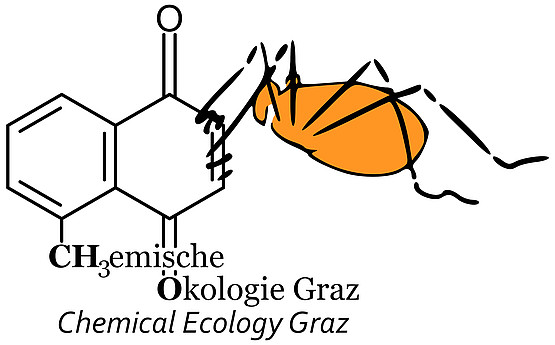FWF-Projekt P33840-B "Small molecules from soil-dwelling arthropods ('SMARTs')"
“Small molecules from soil-dwelling arthropods (“SMARTs”): A new and unusual source for bioactive compounds”
PI: Günther Raspotnig; project associate: Michaela Bodner
1) Wider research context/ theoretical framework: Arthropods are chemists par excellence: most species possess exocrine glands in which they produce chemical protectants against predators and microorganisms. Such secretions comprise a stunning diversity of small lipid molecules, representing a rich, but largely unexplored source of bioactive compounds. In soil - a moist, dirty, and microorganism-rich habitat - a large diversity of chemically protected ancient arthropod taxa is found: these soil-dwellers belong to groups such as Oribatida (Acari), Opiliones, Collembola, and Diplopoda, and represent taxa that look back to an evolution of several 100 of millions of years. Such taxa have literally had enough time to diversify and perfect their chemical defenses. Interestingly, most therapeutics are small lipid molecules that meet Lipinski’s “rule of five”, a concept to preliminarily evaluate the “druglikeliness” of a compound. Small molecules from arthropods (SMARTs) perfectly fit into this category.
2) Hypotheses/ research questions/ objectives: Only very little research has been done with respect to the chemical ecology of soil-dwelling taxa, but has already led to the elucidation of several unusual, bioactive components that exclusively occur in these animals. We hypothesize that particularly soil-arthropods – being equipped with a large number of exocrine glands to survive in their dirty, microorganism-rich habitat - possess a diversity of bioactive compounds far beyond the current state of knowledge.
Objectives are i) to locate promising soil-arthropod taxa for a chemical screening ii) to extract secretions from selected taxa, followed by a complete chemical analysis of compounds; iii) to test (screen) secretion compounds for bioactivity in bioassays.
3) Approach/ methods: Methods will include: i) Collection of selected taxa of all major groups in Austria, the Czech Republic, Poland, Germany, Italy, France, Spain, and all over the Balkans, relying on a unique network of specialists for different groups of soil Arthropoda. ii) Extraction and chemical analysis of exocrine secretions by modern mass spectrometric (including high-resolution MS) and nuclear magnetic resonance spectroscopic methods. iii) Evaluation of the bioactivity of extracts and their single (purified or synthesized) compounds in bioassays, mainly focusing on their antimicrobial activity but also measuring cellular responses of cultivated cells subsequent to component exposure.
4) Level of originality/ innovation: The proposed concept will result in the first representative screening of a new, unusual, and so far neglected source of promising bio-pharmaceuticals.
5) Primary researchers involved: Günther Raspotnig (zoology, chemical ecology), Hans-Jörg Leis (chemistry/medicine/pharmacology), Slobodan Makarov (chemical ecology, bioactivity screening)
Günther Raspotnig
GruppenleiterInstitut für Biologie
Universitätsplatz 2
8010 Graz

